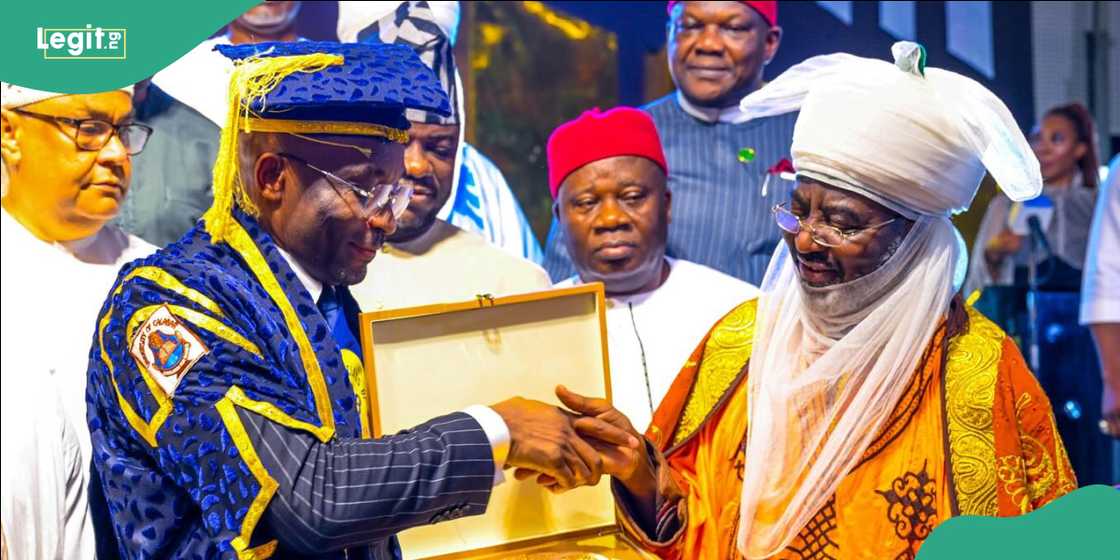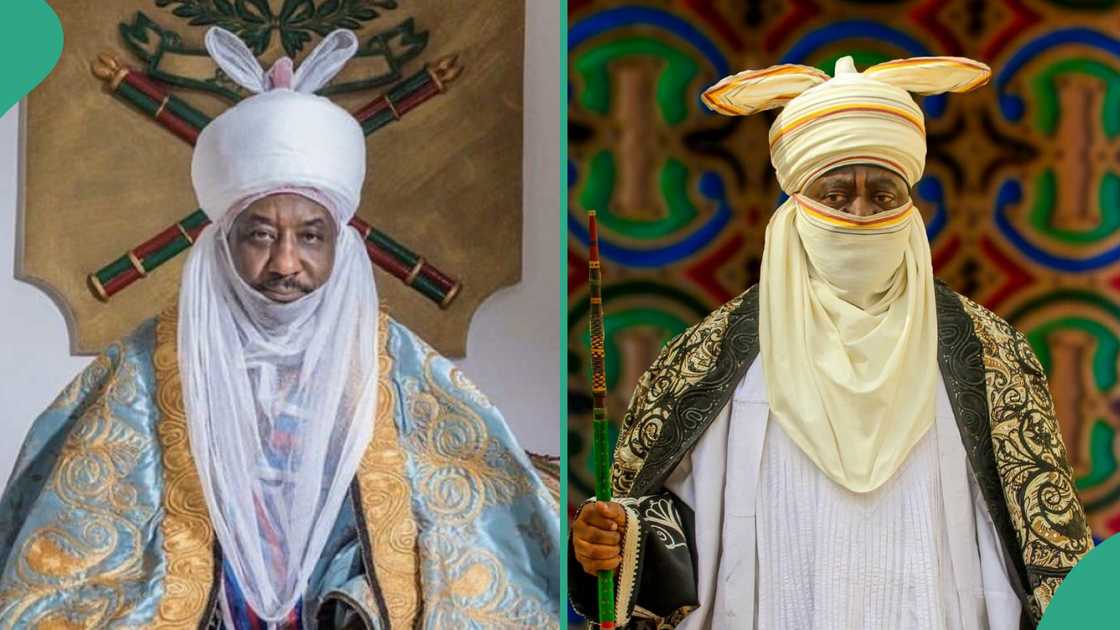How Deputy Speaker Kalu Sidestepped Naming Aminu Bayero as Emir of Kano Amid Emirship Tussle
- The Deputy Speaker of the National Assembly, Benjamin Kalu, avoided addressing Alhaji Aminu Ado Bayero as the Emir of Kano during a high-profile event at the University of Calabar
- Analysts suggest the snub reflects deeper political dynamics, as the Kano emirship crisis remains a battleground for power struggles between political and traditional factions
- While the omission may not legally impact the emirship decision, it symbolically highlights the divided support for Bayero, even at the federal level
CHECK OUT: How to Start Earning with Copywriting in Just 7 Days – Even if You’re a Complete Beginner
The ongoing emirship tussle in Kano has taken yet another dramatic turn on Friday, March 21, as the Deputy Speaker of the national assembly, Benjamin Kalu, conspicuously avoided recognizing Alhaji Aminu Ado Bayero as the Emir of Kano during a high-profile event at the University of Calabar.

Source: Facebook
Kalu delivers keynote address at UNICAL convocation
A political analyst suggested that the snub could be linked to the broader political dynamics in the country.
Checks by Legit.ng revealed that the Deputy Speaker was among the dignitaries who attended the 50th Anniversary and 37th Convocation Lecture of the University of Calabar, where he delivered a keynote address titled “Our Gown in Town and in Cyberspace: Sustainable and Human-Centered Education, The Mandate of Our Universities, 2025-2075.”
However, while acknowledging other prominent attendees, including the Senate President, Senator Godswill Akpabio, and the Chancellor of the University, Alhaji Aminu Ado Bayero, the Deputy Speaker notably refrained from referring to Bayero as the Emir of Kano.
The omission did not go unnoticed, as it comes amid a lingering power struggle over the Kano emirship.

Source: Facebook
Alhaji Aminu Ado Bayero, the Chancellor of the University of Calabar; and Alhaji Sanusi Lamido Sanusi, the former Central Bank Governor, have been at the center of a contentious battle for the throne, with both figures enjoying support from different political and traditional factions.
Meanwhile, the Deputy Speaker’s refusal to recognise Bayero as Emir has been interpreted by many as a subtle nod to the ongoing dispute with some potential implications for the emirship tussle and national politics.
Political analyst dissects impact of snub
Speaking with Legit.ng's correspondence in Kano, a political analyst, Dr. Riyaudden Zubairu Maitama of Bayero University Kano’s department of political science, suggested that the snub could be linked to the broader political dynamics in the country.
Dr. Maitama argued that the whole issue surrounding this emirship tussle is political and political permutations by politicians, particularly the influence of federal power brokers in the Kano emirship crisis as a tool to hold ground and decide their fate in the 2027 presidential election particularly.
“Although the position of the constitution is very clear that the governor and the state assembly are the ultimate institutions to decide who shall be the emir and under what circumstances, the event that happens in Calabar is not something that is so significant in deciding who is going to be the emir or who is going to succeed in this battle.”
“The event in Calabar did not clearly represent the position of the president of the Federal Republic of Nigeria. Probably, it is the personal position of the deputy speaker of the national assembly, which I think maybe his personal position and opinion, which may not necessarily impact directly on the issue of deciding who shall be the emir or not,” he added.
He however stressed that symbolically and politically, the action of the deputy speaker carries a weight that even at the federal level where Aminu Ado is getting the sympathy of the federal government, there is no unanimous support over his claim as the emir of Kano, which is now a kind of political weakness from their side.
Kano politics get tough over APC, NNPP
Legit.ng earlier reported that an APC group in Kano has disclosed that the leading opposition in the state would form a shadow government to scrutinise Governor Abba Kabir Yusuf's administration.
Patriotic Volunteers disclosed during its meeting in Kano to update members about its activities on Saturday, February 15.
A shadow government is also referred to as the invisible government or cryptocracy, It is the view that the actual political power does not reside solely with the elected official.
PAY ATTENTION: Сheck out news that is picked exactly for YOU ➡️ find the “Recommended for you” block on the home page and enjoy!
Source: Legit.ng

Ibrahim Sofiyullaha (Editorial Assistant) Ibrahim Sofiyullaha is a graduate of First Technical University, Ibadan. He was the founder and pioneer Editor-in-Chief of a fast-rising campus journalism outfit at his university. Ibrahim is a coauthor of the book Julie, or Sylvia, written in collaboration with two prominent Western authors. He was ranked as the 9th best young writer in Africa by the International Sports Press Association. Ibrahim has contributed insightful articles for major platforms, including Sportskeeda in the UK and Motherly in the United States. Email: ibrahim.sofiyullaha@corp.legit.ng

Usman Bello Balarabe (Kano Correspondent) Kano's regional correspondent, Usman Bello Balarabe is a journalist, media strategist, and university lecturer in the state. He worked as an investigative journalist with Daily Trust Newspaper Nigeria. His career is passionately geared towards stimulating social justice, exposing corruption, ensuring good governance and accountability. In his over 7 years of journalism practice, he has authored investigations and numerous special and beat reports at the intersection of environment, health, education, agriculture, public spending, security, and politics.

